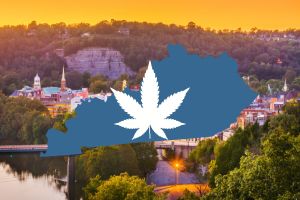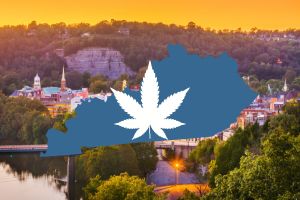Is Hemp Legal in Kentucky?
Posted by Tweedle Farms on Jul 8th 2022

The Legality of Hemp in Kentucky: Navigating the Waters
Kentucky, a state with a rich agricultural heritage, has been at the forefront of the hemp revolution in the United States. The state's foray into hemp cultivation and production is a beacon for industry leaders, newcomes, and consumers alike as they all simultaneously navigate the complex landscape of cannabis laws. This article delves into the legality of hemp in Kentucky, focusing on hemp products, CBD flower, and THCA flower, and addresses concerns pertinent to industry stakeholders as well as consumers.
Kentucky's Hemp Legacy
Kentucky's history with hemp dates back to the 18th century when it was a key crop for fiber production. The 21st-century revival of hemp in Kentucky, however, is primarily focused on cannabidiol (CBD) production, as well as other cannabinoids. The state's reengagement with hemp cultivation was bolstered by the 2014 Farm Bill, which allowed states to implement hemp research and pilot programs. Kentucky was one of the first to jump on this opportunity, setting the stage for a burgeoning hemp industry.
Understanding the Legal Framework
The legal landscape for hemp in Kentucky took a significant turn with the passage of the 2018 Farm Bill, which federally legalized hemp containing less than 0.3% delta-9-tetrahydrocannabinol (THC) on a dry weight basis. This distinction between hemp and marijuana (cannabis containing more than 0.3% THC) is crucial in understanding the legal status of hemp and its derivatives, including hemp products, CBD flower, CBG flower, and THCA flower in Kentucky.
Kentucky aligned its state laws with the federal mandate through House Bill 333, which decriminalized CBD and effectively permitted the cultivation, production, and sale of hemp products. The Kentucky Department of Agriculture (KDA) oversees the hemp program, ensuring compliance with both state and federal regulations.
Hemp Flower and CBD Flower: A Flourishing Market
The market for CBD hemp flower in Kentucky has seen exponential growth.
Hemp flower refers to the bud of the hemp plant, which is rich in cannabinoids and terpenes, and is most often used as extraction material for making concentrated cannabinoid products. CBD flower, on the other hand, is bred to contain high levels of CBD with THC levels below the 0.3% threshold. Finally, CBG flower is a type of hemp that has been bred to exhibit a significant concentration of cannabigerol (CBG). These products have become increasingly popular for their therapeutic potential without the psychoactive effects associated with higher THC levels.
Cultivators and processors are tapping into advanced breeding and cultivation techniques to produce high-quality, compliant hemp and CBD flower products. Retailers and dispensaries, on the other hand, are expanding their product offerings to meet consumer demand, emphasizing the importance of sourcing from licensed and reputable producers to ensure compliance and quality.
However, the industry faces challenges, particularly in terms of regulatory compliance and market saturation. Stakeholders must navigate evolving regulations, ensure rigorous testing protocols are in place, and differentiate their products in an increasingly crowded market. Consumer education is also paramount, as there remains confusion about the differences between hemp, CBD, and marijuana products.
THCA Flower: Navigating Legal Ambiguities
THCA flower represents a more complex segment of the hemp market. Tetrahydrocannabinolic acid (THCA) is a non-psychoactive precursor to THC found in raw cannabis plants. When THCA is heated, it converts to THC, the compound responsible for marijuana's psychoactive effects. The legal status of THCA flower is relatively clear because THCA converts to THC when burned.
For Kentucky's hemp industry and consumers, the legal nuances surrounding THCA flower necessitate caution. While THCA in its raw, non-decarboxylated form is not psychoactive and therefore not regulated as THC, the potential for conversion through heating or processing complicates its legal status. Additionally, because the Farm Bill necessitates a total THC percentage of less than 0.3%, THCA flower becomes a clear legal risk.
Consumer Considerations: Quality, Safety, and Legality
For consumers in Kentucky, navigating the hemp market requires diligence. Key considerations include:
Looking Ahead: The Future of Hemp in Kentucky
The future of hemp in Kentucky is poised for continued growth, driven by innovation, research, and regulatory evolution. As the industry matures, stakeholders can anticipate more nuanced regulations, particularly concerning cannabinoid profiling and product labeling. The focus on sustainability, crop diversification, and value-added hemp products is likely to shape the industry's trajectory, offering new opportunities and challenges alike.
For consumers, the expanding market promises greater product variety and accessibility, but also underscores the need for informed decision-making. As Kentucky continues to solidify its position in the national hemp landscape, the interplay between legal frameworks, industry practices, and consumer behavior will be pivotal in shaping the state's hemp legacy.
Conclusion
Kentucky's journey with hemp, from its historical roots to its contemporary resurgence, encapsulates a broader narrative of agricultural innovation, regulatory adaptation, and market dynamics. The legality and viability of hemp products in the state reflect a complex interplay of federal and state laws, industry imperatives, and consumer interests. As Kentucky navigates this evolving landscape, the commitment of all stakeholders to compliance, quality, and education will be instrumental in harnessing the full potential of this versatile crop.



